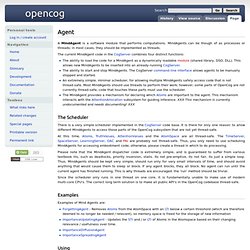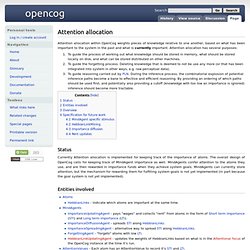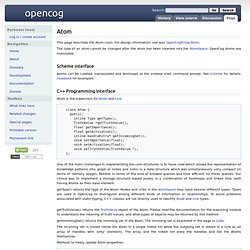

Influence & ranking. Integral... Game Mechanics & Design. Human-based computation. Holon & co... Agent. A MindAgent is a software module that performs computations.

MindAgents can be though of as processes or threads; in most cases, they should be implemented as threads. The current MindAgent code in the CogServer combines four distinct functions: The ability to load the code for a MindAgent as a dynamically loadable module (shared library, DSO, DLL). This allows new MindAgents to be inserted into an already-running CogServer. The ability to start and stop MindAgents. The Scheduler There is a very simple scheduler implemented in the CogServer code base. At this time, Atoms, TruthValues, AttentionValues and the AtomSpace are all thread-safe. Please note that the MindAgent dispatcher code is extremely simple, and is guaranteed to suffer from various textbook ills, such as deadlocks, priority inversion, stalls. Since the scheduler only runs in one thread on one core, it is fundamentally unable to make use of modern multi-core CPU's. Examples Examples of Mind Agents are: Using See also.
Personnal Data. Big Data. Web Genome. C.F.O.I.R. Identities & roles. Culture & Meme. World Community Grid - Accueil. Consom'Acteur. Attention allocation. Attention allocation within OpenCog weights pieces of knowledge relative to one another, based on what has been important to the system in the past and what is currently important.

Attention allocation has several purposes: To guide the process of working out what knowledge should be stored in memory, what should be stored locally on disk, and what can be stored distributed on other machines. To guide the forgetting process. Deleting knowledge that is deemed to not be use any more (or that has been integrated into system in other ways, e.g. raw perceptual data).
To guide reasoning carried out by PLN. Status Currently Attention allocation is implemented for keeping track of the importance of atoms. Entities involved Atoms HebbianLinks - indicate which atoms are important at the same time. Overview This sections presents how the flow of attention allocation works. Rewarding "useful" atoms: Atoms are given stimulus by a MindAgent if they've been useful in achieving the MindAgent's goals.
Metamotivation. Inner Quest. Dimensions of Value. Atom. This page describes the Atom class.

For design information, see also OpenCogPrime:Atom. The type of an atom cannot be changed after the atom has been inserted into the AtomSpace: OpenCog atoms are immutable. Scheme interface Atoms can be created, manipulated and destroyed at the scheme shell command prompt. See scheme for details; cookbook for examples. C++ Programming Interface Atom is the superclass for Node and Link. One of the main challenges in implementing the core structures is to have code which allows the representation of knowledge patterns (the graph of nodes and links) in a data structure which was simultaneously very compact (in terms of memory usage), flexible in terms of the kind of allowed queries and time efficient for these queries.
GetType() returns the type of the Atom. GetTruthValue() returns the TruthValue object of the Atom. GetIncomingSet() returns the incoming set of the Atom. Methods to freely update Atom properties: setTruthValue() setImportance() setActivation() Money 4 Causes... Classification schemes. Icons - logos - Pictos...